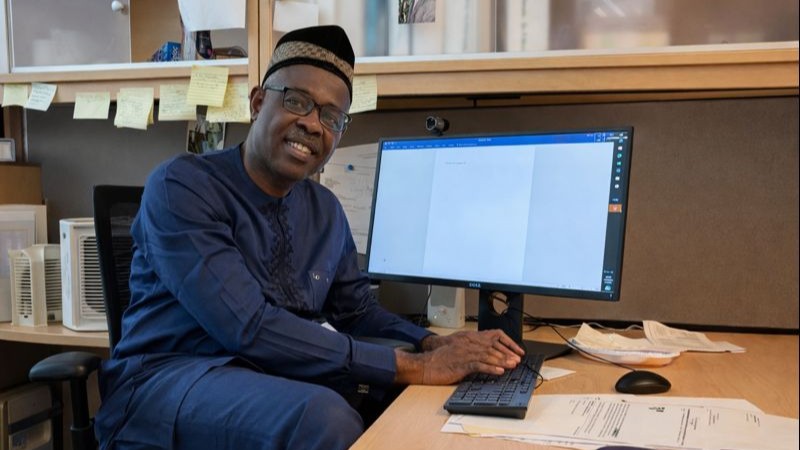
Bello Hassan, FCA, Managing Director, NDIC
BELLO HASSAN : A DISTINGUISHED ACCOUNTANT PUTTING VISION TO WORK AT NDIC
Mr. Bello Hassan OON, is the Managing Director and Chief Executive Officer of the Nigeria Deposit Insurance Corporation (NDIC). He is currently an Executive Council (EXCO) Member of the the International Association of Deposit Insurers (IADI), the Vice Chair of Africa Regional Committee (ARC) of IADI and was a member of the erstwhile Council Committees of IADI (Member Relations Council Committee, Core Principles and Research Council Committee, as well as Training and Technical Assistance Council Committee). Bello also served on the Core Principles Review as well as the Governance Working Group.
Prior to joining the Corporation, he spent 32 years at the Central Bank of Nigeria (CBN) where he was at the forefront of the on-site/off-site supervision of banks and other financial institutions as well as tackling financial stability issues.
A Fellow of the Institute of Chartered Accountants of Nigeria (ICAN) and Fellow of the Chartered Institute of Bankers of Nigeria, Bello Hassan holds a B.Sc. (Hons) in Accounting and an MBA from the prestigious Ahmadu Bello University, Zaria. He also holds a Diploma in Business Continuity Management from Coventry University, UK.
What informed your decision to become an accountant, and what are the personal principles that drove your competence and professional experience to this enviable height?
I think in life many of our decisions are influenced by the circumstances we found ourselves. When I was growing at my youthful age I wanted to become a teacher because I cherished most of my teachers, had passion for what they were doing and wanted to be like them. However, during my university preliminary studies at College of Advanced Studies Zaria, I developed deep interest in mathematics and began to think of pursuing a degree program that has bias in quantitative and that was how I made first choice of study to be accounting and was offered admission by Ahmadu Bello University to study B. Sc. Accounting. During my undergraduate studies, I began to look at people that have made mark in life as accountants and aspired to be like them. After graduation and completion of the mandatory National Youth Service Corp, I was employed by Katsina state and posted to the Ministry of Finance and shortly left and join the services of the Central Bank of Nigeria.
For an accountant, professionalism is the key to success and this led me to pursue professional certification through the Institute of Chartered Accountants of Nigeria and qualified as Chartered Accountant. The greater part of my career at the Central Bank was within the regulatory departments where you need to review financials of banks and compute some prudential ratios to assess compliance, safety and soundness of the bank assigned to you as analyst.
In terms of personal principles, my late parents had admonished me that I should at all times, imbibe the spirit of humility, dedication and sincerity in all my dealings whether in official or private capacities. The internalization of these values coupled with the tremendous support I receive from my wife have really facilitated my career progression. Most of my career, I have worked in Team based settings, where professionalism and competence is highly required and one’s attitude, commitment, input and output can easily be assessed and compared with other members of his Team. Therefore, in this type of setting, one was constantly challenged to offer his best.
As the Managing Director of NDIC, what strategies are you implementing to strengthen Nigeria’s financial sector, particularly in ensuring deposit insurance and bank stability?
Let me remind us of the NDIC’s mandates, which include deposit guarantee, bank supervision, failure resolution and liquidation. Like I mentioned severally, my vision for the NDIC upon assumption of duty as the MD/CEO, was to reposition the Corporation for operational excellence to achieve its vision of becoming one of the best deposit insurers in the world.
My initial approach to this mission began by identifying and addressing critical challenges that over the years inhibited the Corporation’s ability to efficiently delivered on its mandates. Some of these challenges were inadequate legal framework, inadequacy of the deposit insurance cover, delay in payment of insured deposits during liquidation, slow recovery of debts owed to banks in-liquidation, inability of differential premium assessment system (DPAS) to enhance sound risk management practices in insured financial institutions and inadequate financial literacy among smaller depositors.
Therefore, to address the challenges, we first recognized the urgent need to review and improve the legal framework of the Corporation which has not been reviewed since 2006 despite the enormous developments that had happened within the banking industry over the period. In response to this, the NDIC collaborated with the National Assembly to review the NDIC Act. This effort led to the enactment of the NDIC Act 2023. The changes in the new Act, had aligned the Corporation with international best practices for deposit insurance, strengthened the NDIC’s capacity to recover debt owed to failed banks and to hold instigators of bank failure into account, aligned our legal framework with existing Acts of the National Assembly and mandated the Corporation to expedite action in reimbursing depositors in the event of bank failure, among others. In the area of deposit guarantee cover, we reviewed upwards significantly, the maximum deposit insurance coverage levels for depositors of all license deposit taking institutions in April this year.
We are currently developing an effective methodology for determining a realistic target funding for the Corporation to ensure sustainability of the deposit insurance funds. This effort is targeted at ensuring that the deposit insurance scheme of the NDIC remains credible at all times and that the Corporation will be able to timely reimburse depositors. Additionally, we have gone an advance stage in the review of our approach to the determination of premium by banks to make it more risk-sensitive, such that, the probability of the risk crystallizing becomes a major factor in the pricing methodology of our premium going forward.
With regard to timely reimbursement of depositors in the event of license revocation, the Corporation has developed and implemented fabulous initiatives in response to historical depositor apathy and delay associated with the physical depositor verification process.
We have also developed a depositor tracing framework targeted at tracing depositors through various approaches and ensure that, such depositors are duly reimbursed their deposits trapped in a failed bank or other financial institutions. We have also collaborated and leveraged on the NIBSS BVN database to locate depositors’ alternate account in other banks to seamlessly reimburse them without the need to come for physical verification.
What role do you believe accountants should play in promoting transparency, accountability, and good governance in Nigeria’s financial sector and how does NDIC embody these values?
Excellent question! Good governance demands that the institutions are run in a manner that considers the collective interest of the relevant stakeholders. An accountant by training, is well guided by ethical and professional code of conduct and his role in maintaining appropriate accounting records, providing the right information, financial expertise, ensuring transparency and compliance with extant laws and regulations, no doubt, contributes to the long run survival of the entity.
In the financial sector, the role of supervision in instituting good governance and public confidence is appreciated by all. It is important to note however that, surveillance of the financial institutions requires that the supervised institutions are able to maintain and submit quality information on a regular basis to the supervisors for their supervisory review and action. In this regard, accountants should undoubtedly champion this role by ensuring that financial institutions maintain quality financial records consistent with accounting standards and regulatory requirements. The immense contributions of internal and external auditors in enhancing ethical behaviours, transparency and good governance have been quite relevant in promoting public trust and stability of the financial system. Accounting standards like International Financial Reporting Standards (IFRS) have been at the cornerstone of adequate disclosure of financial information that will support effective decision making by stakeholders of the reporting entity. Accountants should therefore ensure compliance with relevant accounting and reporting standards while presenting financial information to the general public.
At the NDIC, transparency, accountability and good governance is part of our values. The Corporation has been identified for various special recognitions and awards amongst the comity of Ministries, Departments and Agencies (MDAs) by credible bodies and institutions: For instance, the Corporation was awarded the Overall Best Public Institution among 360 MDAs by the Independent Corrupt Practices and Other Related Offences Commission (ICPC) in the 2023 Ethics and Integrity Compliance Scorecard (EICS). The Corporation won the First Position in the 2021 Transparency & Integrity Index. It is a public sector assessment initiative by the Center for Fiscal Transparency & Integrity Watch (CeFTIW), a non-
governmental and non-partisan organization established in 2016 and supported by the MacArthur Foundation with the aim of promoting accountability and transparency within the public sector.
Other recognitions and awards won by the Corporation included, a Platinum Award of the Bureau of Public Service Reform (BPSR) based on assessment of the Corporation on governance, financial management, strategic planning, operational leadership and procurement management, among others. The Corporation also attained three ISO Certifications through the MSECB, a leading international provider of Audit and
Certification Services in 2023, namely: Information Security Management System ISO/IEC 27001:2013, IT Service Management System ISO/IEC 20000-1:2011, and Business Continuity Management System, ISO 22301. I will like to add that the Corporation won the Best Performing Ministerial
SERVICOM Unit (MSU) in the Team “C” Category for Ministries, Departments and Agencies (MDAs) by the SERVICOM Office of the Presidency in 2023. All these milestones were recorded by the Corporation as a result of our collective commitment to professionalism, ethics, transparency, accountability, and good governance that have become part of our daily lives.
Can you highlight the key challenges facing Nigeria’s financial sector, and how do you envision NDIC contributing to address these challenges and promote economic growth?
Despite the level of stability recorded in the sector, there are challenges associated with cybersecurity threats requiring financial institutions to invest heavily in cybersecurity infrastructure to protect their systems and customer data.
There are several initiatives implemented to manage cybersecurity risks in the financial system. The NDIC in collaboration with the CBN conducts cybersecurity examination and spot checks regularly and provide timely supervisory advice on how to strengthen cyber controls to protect assets.
As we are aware, some of the vulnerabilities that promote cyber fraud is inadequate financial literacy where less-informed customers of banks compromise their security credentials. The NDIC has been doing quite a lot in the area of financial literacy to educate customers of the financial services providers across the country. The NDIC has developed curricula on deposit insurance system for introduction into the academic programmes of universities in the country. The Corporation also conducts nationwide sensitization of National Youth Service Corps (NYSC) members and students in different institutions.
The NDIC hosts the annual Workshop for Business Editors and Finance Correspondents Association of Nigeria (FICAN) to promote understanding and enhance quality reportage for promoting the safety, soundness and financial system stability in Nigeria. Furthermore, we have a 24 hour NDIC Help Desk that educate and enlighten depositors as well as attend to enquiries and issues raised by customers of banks and the general public.
You may also recall that in May this year the CBN issued RiskBased Cybersecurity Framework outlining the minimum cybersecurity controls to be put in place by DMBs and PSBs. The framework which replaces the Risk-based Cybersecurity Framework and Guidelines for Deposit Money Banks and Payment Service Providers of October 2018, addresses emerging gaps in the cybersecurity landscape and provides guidance in the implementation of cybersecurity programmes towards enhancing resilience in the financial sector.
As an outstanding accountant and nation builder, what advice would you give to young accounting professionals aspiring to make a similar impact in Nigeria’s financial sector?
For the young accounting professionals who may want make an impact in the Nigeria’s financial sector, they must imbibe good value system and acquire the right skills. Financial sector is one of the most evolving and dynamic sectors that requires continuous learning and development to remain relevant. I will advise specialization and acquiring the right skills to distinguish your output from others. Accountants by the nature of their training have the potentials to excel in the financial sector. Therefore, one should identify his area of strength and leverage on it.
Looking back on your career, what do you hope to leave behind, and how do you want to be remembered for your contributions to nation building?
When I resumed as the MD/CEO, I had a vision of transforming the Corporation to one of the best deposit insurers in the world. I have consistently been conscious of my aspiration for the NDIC and this has been my guiding principle and driver for the various initiatives implemented within the last three and half years of my leadership.
I will want be remembered for where the NDIC will be when I am leaving compared with where the Corporation was when I came in as the MD/CEO. I want make every staff of the Corporation to be proud to say he or she is a staff of the Corporation. This can only be possible when the Corporation is respected by its stakeholders for being effective and efficient in the discharge of its mandates. If I may ask you, how do the general public perceive the Corporation’s deposit insurance scheme, when the coverage for depositor of commercial, merchant or non-interest bank was N500,000 per depositor per bank compared with present revised coverage of N5 million per depositor per bank? Again, how do the general public rate the Corporation’s initiative of reimbursing depositors of the defunct Heritage bank through the Bank Verification Number (BVN) as unique identifier to locate depositors’ alternate accounts in other banks without the need to fill forms or visits the NDIC offices?

Pastor Uwem Andrew-Essien, FCA, FCTI
Permanent Secretary/Accountant-General, Akwa Ibom State
PASTOR UWEM ANDREW-ESSIEN : Vision-Driven Public Servant, Driving Transformative Accounting Reforms With Competence and Character
“Excellence is not a destination; it is a continuous journey that requires passion, dedication, and perseverance.” These words aptly describe Pastor Uwem Andrew-Essien, a vision-driven accountant who is making an indelible mark on Akwa Ibom State public service and Nigeria’s public accounting landscape.
Recognized as one of Nigeria’s most outstanding accountants in nation-building, Pastor Uwem’s remarkable journey is a testament to his unwavering commitment to excellence, integrity, and public service. With over three decades of experience in accounting and public service, he has distinguished himself as a leading light in the profession.
Born in Onna, Akwa Ibom State, his academic foundation laid the groundwork for his illustrious career, demonstrating a steadfast commitment to excellence in education. He earned his Bachelor’s degree in Accounting from the prestigious University of Calabar in 1987, establishing a strong foundation in financial management and accounting principles. This accomplishment was merely the starting point for Pastor Andrew-Essien, as he pursued further knowledge and expertise.
Determined to enhance his skills and understanding of global business practices, he ventured abroad, earning a Master’s in Business Administration (MBA) from the esteemed University of Hartford, Connecticut, in 1993. This international exposure broadened his perspective, equipping him with invaluable insights into financial management, strategic leadership, and best practices in accounting.
With over three decades of professional experience, Pastor Andrew-Essien has navigated the complexities of accounting, finance, and public service with remarkable distinction. His early career was marked by a successful stint as a lecturer at Akwa Ibom State Polytechnic, Ikot Osurua, where he also served as Head of the Accountancy Department. His expertise was soon sought after by various polytechnics, and he served as an external assessor, while also contributing to the National Board of Technical Education as a resource person.
In 2015, Pastor Andrew-Essien’s expertise caught the attention of the Akwa Ibom State Government, and he was appointed Special Assistant to the Governor on Due Process. This marked the beginning of his illustrious career in public service which has seen him serve as Director of Accounts in the Office of the Accountant General, Acting Accountant General, and ultimately, Substantive Accountant General, a position he has held with distinction since August 2017.
Passionate about upholding the ethics of his chosen profession, his dedication to upholding the highest standards of accounting and financial management is evident in his affiliation with esteemed professional organizations. As a Fellow of the Institute of Chartered Accountants of Nigeria (FCA) since 2010, and a Fellow of the Chartered Institute of Taxation of Nigeria (FCTI) since 2015, he has consistently demonstrated his commitment to excellence. Additionally, he is a member of the Association of Professional Bodies of Nigeria (APBN).
Throughout his career, Pastor Andrew-Essien has held leadership roles in various professional bodies, including serving as Chairman of the Institute of Chartered Accountants of Nigeria, Uyo and District Society, Treasurer of the ICAN Eastern Districts Conference, and Member of the ICAN-ATSWA Committee. These positions have enabled him to contribute to the development of the accounting profession, mentor future leaders, and shape the financial landscape of Nigeria.
Committed to making his mark in the accounting practice, he has diligently driven due process with hard work, team work and discipline. These principles have kept his name on the lips of many professionals within and outside the state, who still value productivity in public service. As the Accountant-General of Akwa Ibom State, he has spearheaded groundbreaking reforms, revolutionizing the state’s financial management landscape. His strategic vision and expertise have been instrumental in shaping the state’s fiscal policies, ensuring accountability, transparency, and good governance.
One of Pastor Andrew-Essien’s most notable achievements is the successful implementation of the International Public Sector Accounting Standards (IPSAS) Accrual Basis in 2021. This milestone positions Akwa Ibom State as one of the pioneers in adopting this globally recognized accounting standard, enhancing transparency, accountability, and fiscal discipline. The implementation of IPSAS has also enabled the state to produce timely and accurate financial reports, providing stakeholders with a clearer picture of its financial performance.
Under his leadership, the Office of the Accountant-General, Akwa Ibom State has streamlined payroll administration, eliminating ghost workers through biometric verification and Bank Verification Number (BVN) integration. This innovative approach has resulted in significant cost savings for the state, while also ensuring that resources are allocated efficiently. Pastor Uwem has also prioritized the payment of gratuities and pensions, ensuring monthly pensions for retired civil servants are up-to-date in 2023. This demonstration of compassion and commitment to the welfare of retirees has earned him widespread acclaim.
His collaboration with the USAID State2State Activity has yielded critical documents, including the Yearly Cash Plan, Budget Profiling Reports, and Review of Finance Law. These reforms have significantly improved the state’s fiscal management, enabling it to respond effectively to emerging challenges. His office has also upgraded computerized accounting software, deploying the Sage X3 ERP System for IPSAS Accrual Accounting. This technological advancement has enhanced the efficiency and accuracy of financial reporting, positioning Akwa Ibom State as a model for other states in Nigeria.
Committed to the seamless implemention of accounting reforms, he has not just prioritized the application of latest accounting softwares and adherence to accounting standards, he pays attention to the training and retraining of staff for effective service delivery. He is instrumental to the establishment of the Akwa Ibom State/ ICAN study Centre which has produced over 320 Chartered accountants in the state.
Pastor Uwem’s exceptional stewardship has earned him numerous accolades, including the Most Outstanding Accountant General award from the National Productivity Centre, Federal Ministry of Labour and Employment, Abuja. He has also received the Outstanding Civil Service Performance Merit Award from the House of Representatives Committee on Governmental Affairs and the Transparency Award in Financial Management and Reporting from the Association of Professional Bodies of Nigeria. These recognitions underscore his commitment to excellence and his role as a trailblazer in Nigeria’s public service. Through his achievements, he has expanded the door of possibility in financial management, inspiring a new generation of leaders to emulate his exemplary standards.
By combining academic excellence, professional distinction, and a commitment to service, Pastor Uwem Andrew-Essien has established himself as a leading figure in Nigeria’s accounting and public service sectors, earning the respect and admiration of his peers and the wider community.
Understanding that effective accounting practices are crucial for transparency and accountability in governance, the Akwa Ibom State Accountant-General in an interview explained that, ” Strong public financial management is vital for economic growth and development. We must be focused on optimization of resource utilization, minimizing waste and maximizing impact. To achieve this, there should be collaboration between government agencies and stakeholders, this is key to effective financial management. Our office is committed to prudent financial management, and as the Accountant-General of this state, my office has been dedicated to supporting the Governor’s ARISE Agenda for a prosperous Akwa Ibom State.”
Admired for his strength of character and adherence to due process, many of the people who have benefitted from his competence, acuity and attention to details believe that his religious background and respect for culture have contributed to his achievements. The experienced accountant is not just a devout Christian, he is a Pastor of the Living Faith Church (Winners Chapel), and this has not affected his deep connection to his socio-cultural environment as a member of Mboho Mkparawa Ibibio.
Focused and disciplined, his remarkable journey represents a significant shift in Nigeria’s public service accounting, and he is changing the atmosphere around his Office to a new one in which leadership is redefined as a sacred trust, not a privilege. Like a master artisan, he has sculpted a new paradigm of public service excellence, where fiscal discipline, transparency, and accountability converge to gradually achieve a more effective fiscal management.

Shaakaa Kanyitor Chira, FCNA, MCFI, Auditor-General for the Federation
SHAAKAA CHIRA : A QUINTESSENTIAL ACCOUNTANT
It is said that the gentle stride of a tiger is not a symbol of cowardice.That aptly describes the person of the gentle, unassuming and thorough-bred Auditor-General for the Federation, Shaakaa Kanyitor Chira, FCNA, MCFI. Rising through the ranks to the peak of his career, Chira exemplifies integrity, honesty, commitment, respect for elders and constituted authority and loyalty, traits he learnt from his no-nonsense father. These traits also inspired his venture into the accountancy profession, where integrity is the watchword and have been his guiding principles and source of his accomplishments in life.
“From my experience I will advise our youths to imbibe principles of honesty and integrity at all times even if it means losing their jobs. There are no alternatives to these principles.”, he said in a recent interview.
Described in government ministries, departments and agencies as Mr. Transparency, Chira has shown in less than one year that he has served as the Auditor-General that it is no longer business as usual and there is a new Sheriff in town. A man of vision with clear understanding of his assignment, soon after his appointment as Auditor-General for the Federation on October 20, 2023 by President Bola Tinubu, he developed a road map that clearly shows how the backlog of audit reports for years 2020, 2021, 2022 and 2023 could be quickly cleared.
So far, he has submitted to the National Assembly: Auditor-General for the Federation Annual Report on the Federal Government of Nigeria Consolidated Financial Statements for the year ended 31st December, 2020; Auditor-General for the Federation Annual Report on Non-compliance/Internal Control Weaknesses in Ministries, Departments and Agencies (MDAs) of the Federal Government of Nigeria Consolidated Financial Statements for the year ended 31st December, 2020, and Auditor-General for the Federation Annual Report on the Federal Government of Nigeria Consolidated Financial Statements for the year ended 31st December, 2021. In addition, the Auditor-General for the Federation Annual Report on Non-compliance/Internal Control Weaknesses in Ministries, Departments and Agencies (MDAs) of the Federal Government of Nigeria Consolidated Financial Statements for the year ended 31st December, 2021 is currently undergoing quality assurance and final editing before printing.
Chira who holds a Master of Science (MSc) Degree in Public Sector Accounting as well as a Master in Business Administration (MBA), is a Fellow, Association of National Accountants of Nigeria (FCNA), Member, Computer Forensics Institute Nigeria (MCFI), as well as Member of the Chartered Institute of Taxation (ACTI). He is a trained AFROSAI-E Performance Auditor and has also received training on: Geopolitics, Industrial Reforms and System Engineering organised by LITESOL consultancy, Dubai, United Arab Emirate (UAE), International Public Sector Accounting Standards (IPSAS) for Executives, Dubai, United Arab Emirate (UAE), International Public Sector Accounting Standards (IPSAS) for Senior Executives by PWC, London, Performance Auditing and Statistics by GIZ and AFROSAI-E South Africa. Others are, Performance Audit by OAuGF in conjunction with AFROSAI-E, Computer Forensics and Fraud Examination, by Office of the Auditor-General for the Federation, AFROSAI-E Performance Auditing, Statistical tools and Data Analysis, by AFROSAI-E, Auditor-General Management Development Programmes by AFROSAI-E, among many others.
He has served in various capacities including, as Deputy Director of Audit: Programme and Performance Audit Department 2018 to 2022 where he took charge of Performance Audit division, took Responsibility for Audit development planning and advised the Director on matters relating to auditing matters; Deputy Director of Audit: Federal Capital Territory/Area Council (FCT/AC) Audit Department Abuja. 2017 taking charge of division and responsibility for Audit development planning assisting in the general administration of the department; Assistant Director of Audit: Legislative Audit Department National Assembly 2016 taking charge of a Branch at the Headquarters and as the Chief Auditor: Office of the Auditor General for the Federation among other numerous positions held.
Serving as the Auditor-General for the Federation has not been without challenges, especially concerning inadequate funding and office accommodation as well as people’s penchant to evade rules, but as a man adequately prepared for the job, he sees these inadequacies as tonics rather than challenges. As he rightly puts it in a recent statement, “Those challenges are not peculiar to my Office. So I am talking to relevant authorities and I am very optimistic of improvement. We have also stepped up our use of technology which i believe will help a great deal in pushing openness and transparency which are essential ingredients of accountability. Mr President is someone who believes in the independence and efficient functioning of the Audit Institution. He did it in Lagos State and he is ready to replicate that at the Federal.”
Speaking further he said, “Another challenge which has been in the public space even before my emergence is the lack of an Audit Bill. The Audit Ordinance of 1956 is long outdated. The Constitution only makes broad provisions while the Audit Act is expected to make specific provisions relating to core aspects of audit, deliverables and timelines, penalties for violations of the provisions of the Act, etc. On this, the 10th National Assembly is making efforts at addressing it. The Federal Audit Service Bill is currently before the 10th Senate for concurrence.”
Chira would want to be remembered for the timely submission of high-quality audit reports to the National Assembly and he also wants to leave the Audit Office as one of the best in the continent and the world in terms of best practices.

Debola Agunbiade, FCA, CEO, CandourCrest Finance
DEBOLA AGUNBIADE : A SEASONED ACCOUNTANT DRIVING FINANCIAL ACCESSIBILITY THROUGH CANDOURCREST
Debola Agunbiade is an economist, chartered accountant, risk manager and financial advisor, with over 22 years working experience in various aspects of accounting, finance, leasing, risk and asset management. She is the Founder/CEO of CandourCrest Group, comprising of CandourCrest Finance Limited and CandourCrest Africa Limited, companies licensed by the Central Bank of Nigeria (CBN) and Equipment Leasing Association of Nigeria (ELAN). A multiple award winner, she was the first female President of the Finance Houses Association of Nigeria, and the body witnessed revival and vibrancy under her leadership.
Prior to setting up CandourCrest. She was the Chief Executive Officer of CFS Financial Services Limited. She was, until her appointment as Chief Executive Officer of CFS Financial Services, responsible for setting up key structures in pioneer roles that formed the bedrock of CFS Financial Services. She occupied roles that included: Head of Finance and Accounts; Head of Internal Audit; Head of Risk & Asset Management; amongst other roles.
Academically, she has acquired herself with degrees in Accounting and in Finance from reputable institutions in Nigeria and abroad ; she had her first degree in Economics from Lagos State University, a Higher National Diploma in Accountancy from Yaba College of Technology, Lagos, an MSc programme in Finance and Investment from University of Salford United Kingdom, and She is an alumnus of the prestigious Lagos Business School, where she participated in the institution’s Chief Executives Programme.
A Fellow of the Institute of Chartered Accountants of Nigeria (ICAN), a professional specialist member of the Institute of Risk Managemen, United Kingdom , Debola is a member of the Institute of Directors of Nigeria (IOD), of the Equipment Leasing Association of Nigeria (ELAN), and an Associate Member of the Chartered Institute of Marketers of Nigeria.
On what drives her passion for accounting, she said that,” Accounting is an important aspect of our daily lives. It is crucial for everyone, whether you are an individual, a micro, small, or medium enterprise (MSME), or a corporate or large institution. Understanding how our daily activities translate into figures has become imperative, particularly in this era.An individual, MSME, or institution that fails to regularly measure its performance has already planned to fail. Hence, accounting has helped all to evaluate success and performance.”
Explaining how CandourCrest Finance is providing solutions to some of the most pressing financial challenges facing Nigerian businesses and individuals today, she said : “Access to finance is one of the major success factors for any individual or business to grow in any economy worldwide. At CandourCrest, we have various products available for individuals, MSMEs, and large organizations. We provide finance to individuals to enable them to purchase properties, cars, generators, household equipment, and meet other personal needs such as school fees and accommodation. In the same vein, we offer finance to MSMEs and corporate organizations in various sectors within the Nigerian economy, such as education, logistics, medical, food, trading, oil and gas, media and advertisement, real estate, etc.”
” Our company has provided credit solutions particularly in the education and healthcare sectors of the economy, thereby making such important services more available in Nigeria, and we provide finance to clients who are unable to secure loans from banks, thereby assisting in economic growth and development, consequently leading to increased employment and improved standards of living.”
As a result of her background, she has the passion of creating an impact by helping other businesses and individuals to succeed through the provision of financial support, sharing of knowledge, skills and experiences acquired over the years. To further pursue this passion, she joined Women in Management, Business and Public Service (WIMBIZ) and Women in Finance Nigeria (WIFNG), non-profit organisations focused on increasing, developing and supporting the success rates of female entrepreneurs, and the proportion of women in senior positions in corporate organisations and the public service.
Passionate about driving financial accessibility through CandourCrest, she shared her vision for the company, ” Our vision for CandourCrest is ambitious. We intend to transform into a pan-African financial services company in the future. Financial services products are relevant for any transformation, and we intend to contribute our quota through the provision of more bespoke financial services products for individuals and businesses, in addition to ensuring we perform our role as a great business partner.”
For young people who are desirous of becoming accountant, Debola Agunbiade offered her advice: ” Accounting is an interesting and required profession in any home, business, or organization. You will definitely be needed. Don’t give up; pursue it and keep being creative and interested in all aspects of any business or company you find yourself in.”






